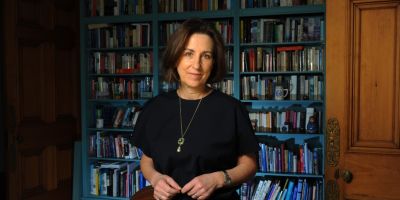Leeds professor to lead international team of experts for new book set to rethink Holocaust literature

A University of Leeds professor will lead a team of more than 40 experts from around the world to create a new book exploring Holocaust literature.
Professor Stuart Taberner, from the University’s School of Languages, Cultures and Societies, has been awarded £1m from the Arts and Humanities Research Council to create the Cambridge History of Holocaust Literature, to be published by Cambridge University Press (CUP).
Professor Taberner will lead the major international collaboration that seeks to analyse more than eight decades of Holocaust texts – from fiction to poetry and survivor testimony – to show the genre of literature can be seen as a ‘literary system’.
Works written in the camps and ghettos during the Holocaust will be reviewed, as well as literature produced in the almost eighty years since, around the world and in dozens of languages, by victims, survivors, their children and grandchildren and many others.

The project will undertake a ‘comprehensive rethinking’ of what Holocaust literature is, how it functions, and what the Holocaust means today using a contemporary lens of power, inequality, human rights and social justice.
Professor Taberner says Holocaust literature is not just ‘a random collection of books’ - and analysis of how texts circulate can show what makes one book a success at a given time, and not another.
He said: “This has to do with relationships of power—which experiences of the Holocaust are considered most ‘important’ in a given time and place (concentration camps rather than mass shootings, for example); which victims are seen as most ‘sympathetic’ (Western European Jews, more like ‘us’, rather than Yiddish-speaking, ‘traditional’ Jews from Eastern Europe); which kinds of storytelling and how that changes over time; which languages and how translation (into English, French, etc) changes the meaning; how publishers promoted some books and held back others, and why.”
He added there is also a wider socio-political context in Holocaust literature being used in debates around controversial topics including abortion, refugees, military interventions and even the Covid-19 pandemic.
With the passing of the final survivors, the Nazi genocide of European Jews is at last truly becoming historical. Yet antisemitic and other racial prejudice, hate speech, and violence are everywhere still present and indeed surging.
“In the context of ethnic and religious conflict, popularism, social and economic precariousness, and even pandemic, the Holocaust is variously invoked as a warning from history; a moral, legal, and political imperative to promote and even enforce universal human rights; and in social and cultural controversies from abortion, animal rights, and climate change to COVID-19 mask mandates and anti-vaccination misinformation.”
The study has the potential to change curricula in schools and universities around the world, expanding and diversifying taught texts beyond the usual literature taught currently such as Primo Levi and Anne Frank.
And the CUP volume, will, for the first time, include Holocaust literature written in Africa.
As well as producing the book, the research project will also include a series of public events, with the team working with the Wiener Holocaust Library in London and the Holocaust Educational Foundation of Northwestern University based in Chicago, Illinois.
Picture of Anne Frank in 1940, while at 6. Montessorischool, Amsterdam, via Wikimedia Commons
Picture of Jewish Italian writer and Holocaust survivor Primo Levi via Wikimedia Commons.




